Event Recap
The Africa Center was pleased to host, in partnership with Semafor, the Open Society Foundations, African Export-Import Bank (Afreximbank), Nigeria Bank of Industry, and Axxess, a high-level public event engaging entrepreneurs and finance experts on investing in Africa’s creative industries. This event occurred on December 15th, 2022, on the margins of the US-Africa Leaders Summit.
The event began with remarks from Semafor CEO Justin Smith, who commented on his organization’s role in dispersing independent journalism. Aubrey Hruby, Africa Center senior fellow, welcomed the audience by introducing the Africa Center’s work leveraging innovative thinking to support Africa’s creative industries.
Following these welcome remarks, the event highlighted the work of two African women making strides in the sectors of art and fashion. Nina Baksmaty, a Ghanaian fashion designer, told the story of her brand, KoshieO, as she tried to shape Africa’s narrative. “The thing is, we sell fantasies and stories through fashion,” she said. “Fashion has the ability to change the way people view our Continent as a whole.” These sentiments were similarly conveyed by Ramatoulaye Diallo, Founder, and CEO of the Great Green Wall of Africa (GGWoA) Foundation and former Malian Minister of Culture. She highlighted GGWoA’s Imagine Project, which sponsored 30 African artists to compose artworks underscoring the organization’s main objectives of promoting climate resiliency across Africa. “It is invigorating to see that this time, Africans have taken the lead in solving Africa’s problems,” she noted. The two speakers demonstrated the ability of Africans to cultivate their own stories and inspire innovative solutions through art.
Next, Akunna Cook, former U.S. Deputy Assistant Secretary of State for African Affairs and current CEO of Next Narrative Africa was welcomed to the stage to open a fireside discussion on boosting trade with the Deputy Prime Minister from the Republic of Namibia, The Hon. Netumbo Nandi-Ndaitwah. Cook began by emphasizing how the creative industries are “key to narrative change,” saying that they “inform the way we Africans see ourselves and see the Continent.” She then turned to Nandi-Ndaitwah to ask about the importance of the creative industries to Namibia. Nandi-Ndaitwah responded by saying, “As an African, the creative industries are what make us discover and realize who we are.” She also outlined the economic benefits to the creative industries, noting how they have the potential to “give Africa a role to play internationally” and how they are “job creators.” Cook also inquired about Namibia’s work to encourage investment into the film and television industries, noting how international films, including the film Mad Max, were filmed in Namibia. “When it comes to the creative industries, Namibia is part and parcel of the international community,” said Nandi-Ndaitwah. Further, she said Namibia is “ready to do serious work…to developing our film industry.” These comments further conveyed the commitment of Namibia to supporting the creative industries as promising sources of investment opportunities, youth employment, and self-led African narratives.
To complement this commitment, Melvine Foote, CEO of the Constituency for Africa, then introduced President and Chair of the United States Export-Import Bank Reta Jo Lewis to discuss the U.S.’s efforts to boost economic collaboration with African creatives. “It’s very clear for us that America fully recognizes the richness and the diversity of African cultures,” she said. “We are keen to partner with all of you to advance the goals of a more prosperous African continent.” She also outlined her commitment to putting the discussion of Africa “at the forefront of conversations with U.S. government leaders.” Lewis’s comments showed how Africa, and African creativity, are a clear priority for U.S. policy.
Finally, Akunna Cook returned to the stage to moderate a panel on accelerating Africa’s creative industries featuring Veronika Chatelain from Open Society Foundations, Dr. Benedict Oramah of Afreximbank, Olukayode Pitan of Bank of Industry Limited, Samba Bathily of ADS Group, and Audu Maikori of Chocolate City Group and Pixel Ray Studios. Cook began by asking Oramah about his efforts to support the creative industries at Afreximbank. “The issue of supporting the creative industries for us was a no-brainer,” said Oramah. He explained how Afreximbank has worked to support, but not redefine, how the “bulk of the population has, on their own, charted a course for development.” The conversation then shifted to Pitan, who discussed the initiatives undertaken by the Bank of Industry. He began by noting the growing importance of the Nigerian film industry, Nollywood, to global filmmaking, saying that “every year, there are about 2,500 films” made in Nigeria. He highlighted two steps the Bank took to de-risk and finance Nigerian filmmaking 1) employing a committee of experts to identify successful film manuscripts and 2) financing those creatives directly to produce the film. According to Pitan, this approach has been frequently adapted to promote the success of Nigerian films in a changing market impacted by the COVID-19 pandemic and global competition. Next, Cook asked Chatelain about her focus at the Open Society Foundations and her work supporting the industry. Chatelain emphasized her projects on art restitution to “repatriate objects that were violently taken from the Continent during colonialism,” and this requires her to work primarily with artists. “Like air, water, food, shelter,” she said, “we need culture to survive.” The Open Society Foundation works to provide grants to “African-led and Africa-centered foundations” to support “socially engaged art,” and this way bolsters the vitality of African creative industries. Bathily also discussed his philanthropy initiatives in the industries through digital infrastructure. As a music fan, Bathily made one of his first investments in a music tour to bring American music to the Continent. For Bathily, investing in the creative industries is “both passion and good for business.” Finally, Cook asked Maikori about his focus on creative infrastructure, noting how currently there is only “1 screen for 8,000 Africans.” Maikori added that, in terms of music streaming services, “the U.S. has 80% of the streaming data for African countries.” “There are no local platforms” to distribute this music, he said. He also discussed the role of storytelling in filmmaking: “What we fail to do is sell our culture through stories, and we have to change that perception.” Overall, the panelists conveyed a clear sense of hope for the future of the African creative industries to attract investment from both local and international actors. Stacie Adams, Senior Vice President of External Affairs at Axxess, closed the panel by thanking the panelists for their remarks and reaffirming Axxess’s commitment to supporting African art and artists both within the U.S. and abroad.
To close the event, Hruby returned to the stage to thank the event’s participants and in-person and virtual attendees for supporting the Africa Center’s work on the creative industries. As Hruby mentioned, the Africa Center looks forward to finding innovative ways to uplift African creative voices across the globe.
Original Event Text
In partnership with the Open Society Foundations, African Export-Import Bank, Nigeria Bank of Industry, and Axxess, and in cooperation with Semafor, the Atlantic Council will host a public high-level event focused on Africa’s creative industries on the margins of the 2022 US-Africa Leaders Summit on December 13-15 in Washington, DC.
Over the past two decades, African markets have unleashed the most significant digital revolution globally. Those markets stretch across a continent that not only includes 17 percent of the entire global population but also hosts the youngest population in the world: 40 percent of the total population is age fifteen or younger. With the development of streaming services, mobile banking, and digital currencies, the digital economy has become vital for African nations and their partners.
In fashion, from Dior to Louis Vuitton, the luxury market is influenced by African culture. In film, successful movies like Black Panther feature African artists. Additionally, streaming platforms like Netflix and Disney+ have increased their reach to African audiences. In the music industry, Nigerian artists such as Burna Boy, Davido, and Wizkid have signed with major American music labels.
The Atlantic Council is the only global think tank in Washington, DC that has placed African creative industries at the center of its work, having authored the first report in 2018 and hosted the Africa Creative Industries Summit of Washington in October 2021 at the Smithsonian National Museum of African Arts. From the Sports Business Forum in Senegal to the Financial Engineering Task Force with development banks, the creative industries are the Africa Center’s signature program. The event will feature leading artists from the United States and Africa, investors, business executives, academia, and government officials from around the world who believe in the power of Africa’s creative industries.
Agenda
Welcome remarks
Amb. Rama Yade , Senior Director, Africa Center
Justin Smith, CEO & Co-Founder, Semafor
Master of ceremony
Aubrey Hruby, Senior Fellow, Africa Center
African art and fashion
A story of fashion
Nina Baksmaty, Founder, KoshieO
Driving Africa’s climate change initiatives through art and culture
Ramatoulaye Diallo, Founder and CEO, Great Green Wall Foundation of Africa (GGWoA)
Fireside discussion: Boosting trade for the creative industries
Featuring
Netumbo Nandi-Ndaitwah, Deputy Prime Minister, The Republic of Namibia
In conversation with
Akunna Cook, CEO, Next Narrative Africa; Former U.S. Deputy Assistant Secretary of State for African Affairs
Keynote remarks
Introduced by
Melvin Foote, CEO, Constituency for Africa
Featuring
Reta Jo Lewis, President and Chair of the Board of Directors, Export-Import Bank of the United States (EXIM)
Accelerating Africa’s creative industries
Moderator
Akunna Cook, CEO, Next Narrative Africa; Former U.S. Deputy Assistant Secretary of State for African Affairs
Panelists
Veronika Chatelain, Program Officer, Art, Culture and Social Justice, Open Society Foundations
Benedict Oramah, President and Chairman of the Board of Directors, Afreximbank
Olukayode Pitan, Managing Director, Bank of Industry Limited
Samba Bathily, CEO, ADS Group
Audu Maikori, Founder, Chocolate City Group and Pixel Ray Studios
Final thoughts
John Olajide, CEO and President, Axxess
Closing remarks
Aubrey Hruby, Senior Fellow, Africa Center
In partnership with




In cooperation with

Recommended content

The Africa Center works to promote dynamic geopolitical partnerships with African states and to redirect US and European policy priorities toward strengthening security and bolstering economic growth and prosperity on the continent.
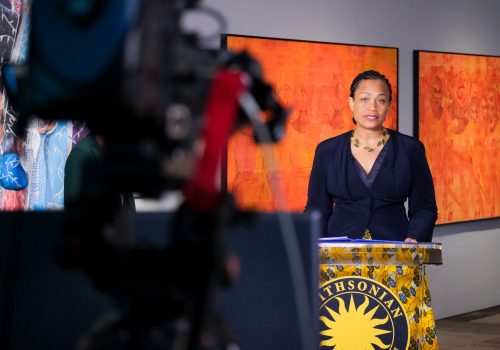
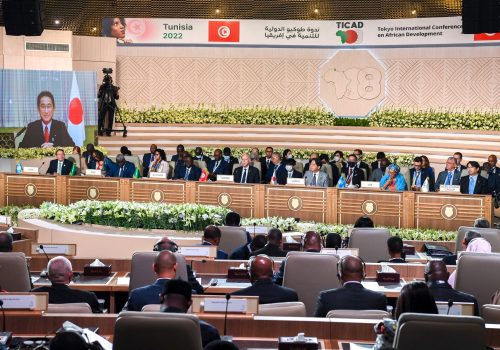
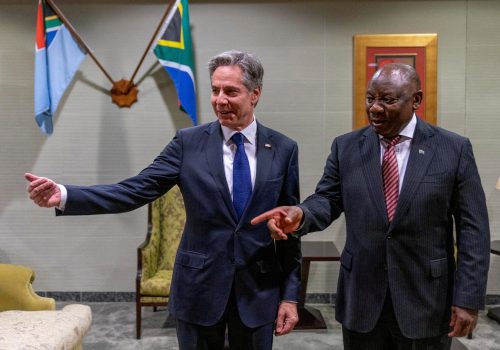

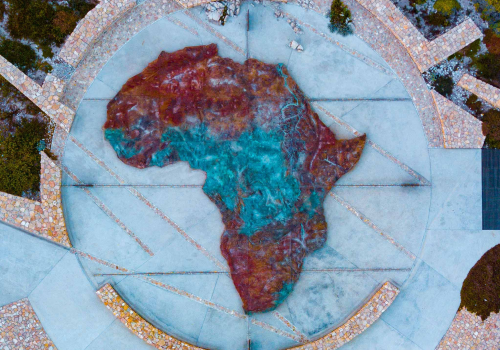
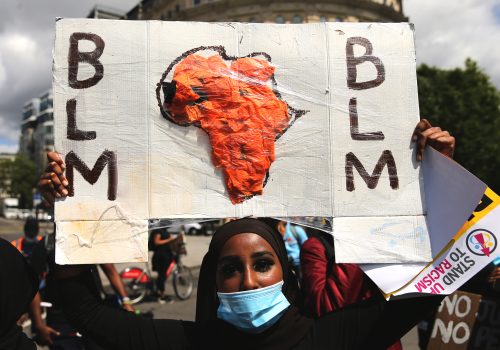
Follow the conversation on social media with @AtlanticCouncil and @ACAfricaCenter using #AfricasTimeHasCome and #AroundThe2022Summit